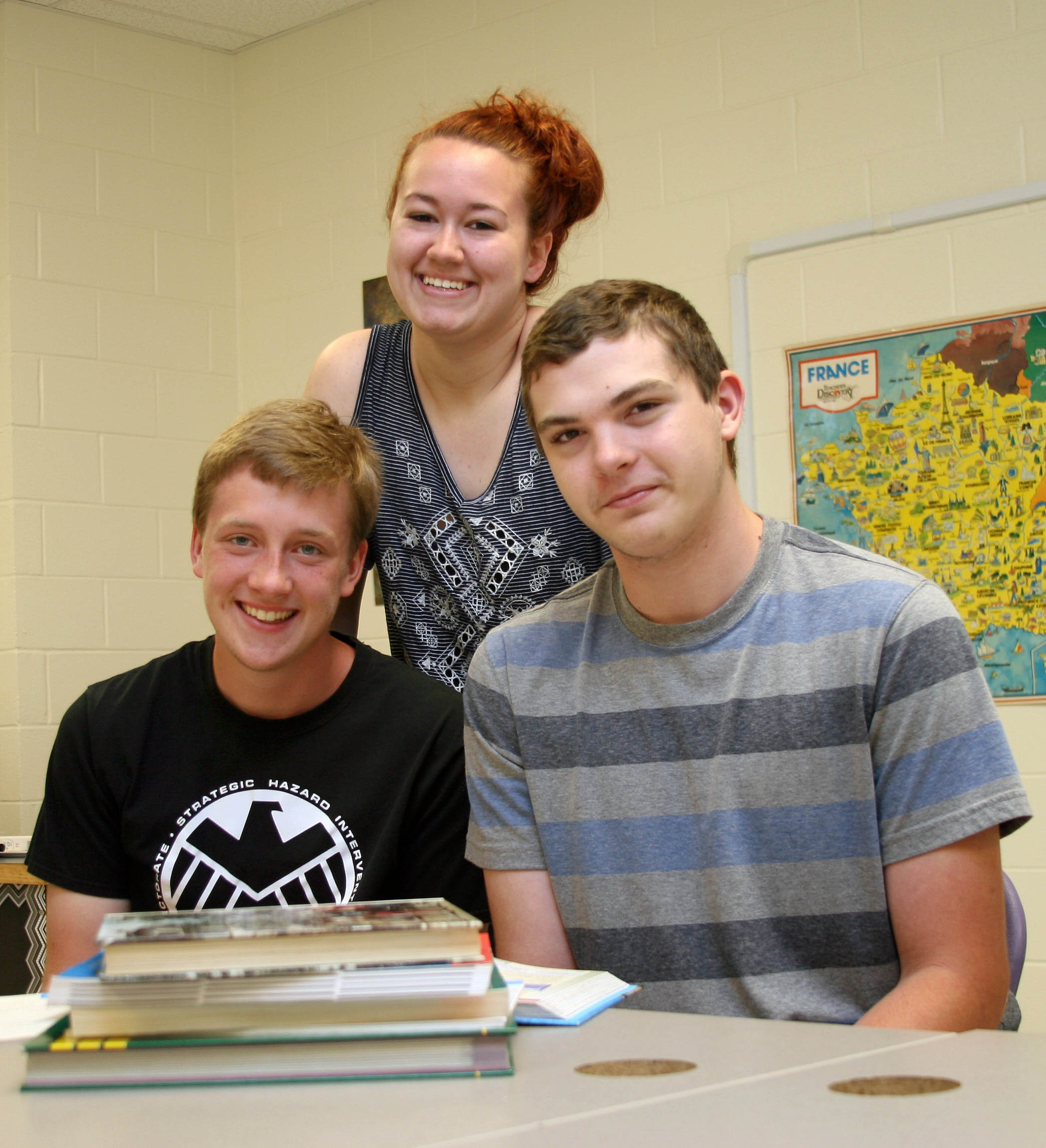
Chatham Charter students Jacob DeKaney (from left), Allyson Everage and Tylor Atkins say taking so many college courses in high school is a challenge, but one that prepares them for a successful future.

SILER CITY - When Chatham Charter School wanted to expand educational options for its small student body on the western edge of rural Chatham County, officials knew high school students were already taking courses tuition free at Central Carolina Community College through a statewide initiative called Career and College Promise.
So, why not build Chatham Charter's entire curriculum around college courses?
That's what they did, and with remarkable success. During the most recent high school commencement in May, Head of School Dr. John Eldridge highlighted some accomplishments of Chatham Charter's 43 graduates.
Among them: The class earned more than 1,500 college credits over a two-year period.
It didn't happen by accident. The arrangement was part of CCCC's ongoing effort to create partnerships with schools and other organizations that give students easy access to all the college has to offer.
Mary Schmid, CCCC's Secondary Partnerships Director, says the goal is to remove barriers that keep people from moving forward in their education and eventually succeeding in life.
"The course sequences we outlined usually provide students with enough credits for the first year of their college degree," she said. "This gives the students a huge advantage, both academically and financially. It makes them more competitive when they apply to college after graduation and more prepared for the workforce once they meet their educational goals."
Pathways to Graduation
When Chatham Charter students enroll in college courses, they don't just pick randomly from a buffet. Under Career and College Promise guidelines, they follow something called a "pathway" -- a sequence of courses that eventually leads to an associate degree or some other recognized credential or college certificate.
Jacob DeKaney, a Pittsboro resident who graduated from Chatham Charter in May, completed the University Transfer Pathway, a sequence designed for students entering four-year universities. For him, the plan was to finish as many college general education requirements as he could in high school, so he could shift quickly into electrical engineering courses when he enrolls this fall at North Carolina State University.
Not only did the experience earn DeKaney college credit, but it prepared him for what he will face this fall. "As I got into the college courses, they were a lot more rigorous," he said. "Not tremendously more difficult, but it took more energy from me to get all of the work completed, which is what I was hoping for."
The vast majority of Chatham Charter students were moving in the same direction. Seventy-six of the 91 juniors and seniors were enrolled in the University Transfer Pathway, but not all of them. Others were following pathways in automotive systems technology, business administration, criminal justice technology, early childhood education, human services technology, medical assisting and a number of others.
Tylor Atkins was scanning a list of options when he ran across welding and became intrigued. He didn't have any experience with the trade at all and, at the time, was actually considering a career in auto mechanics. But the more he thought about welding, the more he wanted to give it a shot. "It was different," he said. "And it was playing with fire."
This spring, the junior from Ramseur began every morning at CCCC's metal shop in Siler City before driving over to Chatham Charter for the rest of his courses. Those 8 a.m. welding classes were something he looked forward to -- a complete break from the usual routine and a chance to see if this is what he really wants to do with his life. (At the moment, he does.) The experience changed his perspective, he said. Not only about school, but about what opportunities could lie ahead.
"Challenging, But a Good Challenge"
When Eldridge and his staff began integrating so many college courses into the Chatham Charter curriculum, the top priority was expanding academic options for students. An added benefit was getting them ready for university life.
Allyson Everage of Siler City just finished her junior year and is on the University Transfer Pathway, taking courses in the arts and math, which is an odd combination at first glance, but makes sense given her interest in computer simulation and game development.
She didn't know exactly what to expect when she walked into the college classroom that first time, but was sure about one thing: It wouldn't be easy. "It's challenging, but a good challenge ...." Everage said. "When I started taking college classes, I was really, really stressed about it. But now, since I'm taking all college classes, I feel like I'm a high school student and a college student at the same time. And I think that's truly something to be proud of."
CCCC's Chatham County Provost Mark Hall believes the partnership has been a success because everyone shares in the responsibility to help students succeed. That includes high school administrators, college instructors and officials, and even the students, themselves, who often end up completing about a dozen college courses before they receive their high school diplomas.
"You have staff at the college who are invested in our kids and we have kids who are invested in their school," said Eldridge. "That's what I call a true partnership."
For more information on Central Carolina Community College, visit the college website at www.cccc.edu.

Chatham Charter students Jacob DeKaney (from left), Allyson Everage and Tylor Atkins say taking so many college courses in high school is a challenge, but one that prepares them for a successful future.